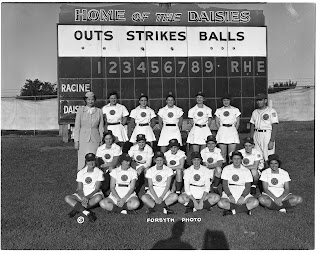Hello fellow mystery seekers, I’m back again with another
Mystery Monday for your viewing pleasure! Today’s topic is on a subject near
and dear to my boss’s heart, the Fort Wayne Daisies.
Some of you Fort Wayne natives out there may be familiar
with the city’s professional female baseball team. From what I’ve been told,
there’s even a movie on it (along with the documentary it was based on. Check
out the History Center’s news page, there’s going to be a showing of it here
November 4th at 6 p.m.) But if you’re anything like me, you most
likely haven’t heard of it, making this iconic Fort Wayne team our mystery of
the week.
To begin with, let’s delve into the history of the team. The
Daisies were a pretty big facet in the Fort Wayne community in their heyday,
during and following the World War II years (1945-1954). With the men all off
at war, women found themselves branching out into new social spheres, including
the ball parks. And let me tell you, these ladies could play. The Daisies made it to the playoffs
every year from 1947 to 1954, ending in first place from 1951 through 1954, won
the final five batting championships of the league and two Player of the Year awards, and, with Helen Callaghan leading all hitters in
1945, the Daisies amassed six batting crowns to set a league record. These
ladies were ferocious on the field and they accomplished all of this while
wearing skirts. Imagine sliding into base bare legged. I’m in awe.
So why are the Daisies
such a mystery? If they accomplished so much, why haven’t more people heard of
them? Well, the answer falls in two parts, one social and the other
technological. After the war ended and the men returned, many of the players
hung up their caps and mitts and settled back into their pre-war routines. In
the book Belles of the Ballpark:
Celebrating the All-American Girls Professional Baseball League, the son of
Helen Callaghan explained, “The way she says it…is that it was a part of her
past. When she started raising a family, that was on her mind, and so she
wanted to do that.”[1]
Some players continued to play ball, but the prevailing era of the Daisies
ended as the women settled down and began families. There are a lot of other
contributing social factors, but it’s a similar story to the women working in
industry and other male-centric areas during the war.
The other reason stems
from the availability of older information within museum settings. In this day
and age, many museums and institutions have begun to make the move from paper
to digital. This transition is very costly, in both money and labor, so the
process can be slow. A lot goes into making a digital catalogue and sometimes
things just fall through the cracks, people forget an artifact exists, or it
just isn’t considered a priority. We only just recently stumbled upon the
archival box holding the brunt of our Daisies’ photos (due to my boss’s sudden
interest in promoting them sparking a memory of a dusty box existing in the
archives room) and have begun the process of converting the collection to
digital. While a daunting task, it leaves me excited for the other mysteries
hiding in the collections. Who knows what could be stumbled upon next?
We have high hopes of creating an exhibit on the Daisies
and their awesome exploits to bring these ladies back from the depths of obscurity
and into the limelight where they belong. If you’d like to help us with this
project, we’re looking for donations and contributors! If any of you out there
know of some Daisies memorabilia and would care to share, contact my boss
(Karen Butler-Clary) at 260.426.2882 (ext 312) or email
at karen.butler-clary@fwhistorycenter.com. We’d love to add it to our exhibit!
Keep an eye out for the
cool events the Center will be hosting to honor the Daisies, because there is
much more to come!
[1] Helmer,
Diana & Owens, Thomas S., Belles of the Ballpark: Celebrating
the All-American Girls Professional Baseball League (Sumner Game Books: New
Jersey, 2015), ix.




No comments:
Post a Comment